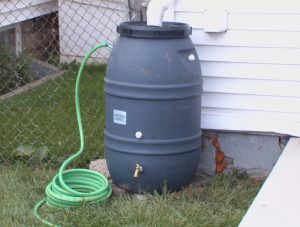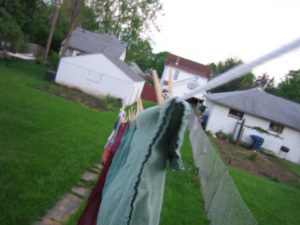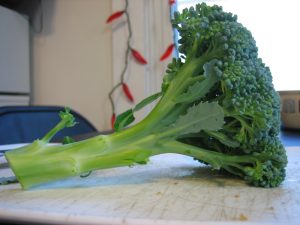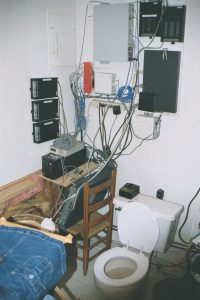Over at ProgressiveWayneCounty.org, I just posted the list of alternative transportation goals for Richmond, Indiana that I came up with in March as a part of my work on the committees that are implementing Richmond's Comprehensive Plan. Comments and feedback welcome (there or here).
Tag: sustainability
 I thoroughly enjoyed this post by Dave Pollard: Need Less.
I thoroughly enjoyed this post by Dave Pollard: Need Less.
The essence of radical simplicity, of the gift/generosity economy, of natural community, and of natural entrepreneurship, I think, is needing less. Needing less makes us, as individuals, members of enterprises, communities and societies, more self-sufficient, and more resilient, and allows us to give more with the 'excess' time, energy and money that we have by virtue of needing less.
Dave goes on to list a few ways that needing less in everyday life might manifest itself. Perhaps obvious to some, overly abstract to others...a pleasant reminder for me.
Thanks to Paul Retherford for pointing me to this essay, Beyond Sustainability: Why an All-Consuming Campaign to Reduce Unsustainability Fails. Highlight:
Our very approach to solving the “problem” of unsustainability is grounded in a mindset that prevents sustainability from emerging. Always anchored to the past, the future is envisioned as being bigger or better. But such an approach will always keep us rooted in the past. To escape from the past, one must think in an entirely different way.
The current ideal of sustainability, as sustainable development, is not a vision for the future. It is merely a modification of the current process of economic development that its proponents claim, in theory, need not cause the terribly destructive consequences of the past. Sustainable development is fundamentally instrumental. It suggests new means, but still old ends. Sustainable appears as an adjective; the noun is still development.
As I look at sustainability efforts in my own life and at sustainability as a local progressive value, it's important to me that someone out there has the right words to say what so many people are afraid to say: there are ways in which the survival of life on Earth is in conflict with traditional economic development, a.k.a. the continued growth of our civilization. Many sustainability efforts are purely or primarily anthropocentric, and therefore fail by definition.
This essay doesn't have all the answers, but it's got a good grip on that particular problem.
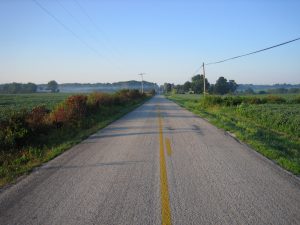 During the Third U.S. Conference on Peak Oil and Community Solutions that I attended last month, I found myself surrounded by an amazing group of hundreds of people who were trying to make changes in the world to move us (the human species) toward sustainability. While I do not limit my thinking on sustainability to the slogan "be the change you want to see in the world" (article on that is forthcoming), I thought it might be useful to take an inventory of the things I'm doing in my own life to reduce my impact on the world and my resource usage in our culture. I also thought it would be important to start to list the areas where I still need to make progress.
During the Third U.S. Conference on Peak Oil and Community Solutions that I attended last month, I found myself surrounded by an amazing group of hundreds of people who were trying to make changes in the world to move us (the human species) toward sustainability. While I do not limit my thinking on sustainability to the slogan "be the change you want to see in the world" (article on that is forthcoming), I thought it might be useful to take an inventory of the things I'm doing in my own life to reduce my impact on the world and my resource usage in our culture. I also thought it would be important to start to list the areas where I still need to make progress.
I don't publish this information as any sort of prescription for anyone else; there are millions of ways to make changes in our lives to do less harm, and not all of them look anything like the below (and some of them contradict the below), so I fully respect that this is what works for me as I experiment, and it may not work for anyone else. There is no one right way to be more sustainable. However, if you find this list useful, or have suggestions or feedback on it, I hope you'll contact me to let me know.
Things I do in my life to reduce my unsustainable resource usage:
- I've created, participate in and financially support multiple community-oriented programs that promote and educate others around messages related to sustainability.
 I have a rain barrel in my yard to collect rainwater for use in gardening and yard work. It reduces the amount of filtered and treated city water I use by just a little bit, but rainwater is also better for my plants.
I have a rain barrel in my yard to collect rainwater for use in gardening and yard work. It reduces the amount of filtered and treated city water I use by just a little bit, but rainwater is also better for my plants.- I mow my yard less than neighborly convention might dictate. I'm working on using a scythe to replace my gas-powered mower (and increase my physical exercise!).
- I replaced the old drafty windows in my house with newer and more sealed ones. This helps reduce the energy needed to keep me comfortable inside. Unfortunately, the replacement windows are made up significantly of petroleum-based products.
- I had a super high-efficiency furnace installed in my house.
- I don't use air conditioning at my house more than 3 or 4 days per year, and use ceiling fans, window shading, and other methods instead. (I do, however, work in an air-conditioned office, so I can't claim to be braving the heat every day.)
- I live in a small town that is easy to get around, has the potential for great community-building, and has a heritage that involves peace and justice, sustainable agriculture and entrepreneurial solutions to difficult problems.
- I've replaced all of the conventional incandescent light bulbs in my house with compact fluorescent bulbs. These are supposed to last much longer and use much less energy.
- I wash my dishes by hand.
- I purchased a high-efficiency front-loading washing machine
 I also purchased a high-efficiency drier, but there really isn't such a thing, so I try to use a clothesline to dry my laundry in the sun when I can.
I also purchased a high-efficiency drier, but there really isn't such a thing, so I try to use a clothesline to dry my laundry in the sun when I can.- I have been working on putting my appliances that use phantom power on power strips that I can turn off when I'm not using them.
- I participate in my city's recycling program
- I compost all organic waste from my cooking and store it in the big compost bin next to my garden.
- I try to buy goods and services from local businesses when possible. This reduces the amount of resources required to bring those items to me, and supports a strong local economy that can be more resilient to fluctuations in energy prices. I especially try not to buy goods and services from businesses that I feel are actively harming local/regional/national natural resources, engaging in slave labor, or participating in the cultural trends toward sacrificing our planet and its lifeforms in the name of increased consumerism.
- I support my local food cooperative by volunteering and serving on their board of directors, and by ordering household staples in bulk from them.
- I try to avoid eating food that will poison my body and potentially increase the resources needed to keep me healthy (now or in the future)
- I avoid buying new products and clothing when I can find them in like-new condition by shopping at Goodwill or the Salvation Army.
- I have installed or am installing low-flow shower heads in my showers.
- I avoid using household chemical products that pollute and cause medical problems
- I ride my bicycle when I have time. Having time to ride a bike is a relative/subjective/complex thing, so I'm working on ways to make more time for riding instead of driving.
- I walk places when I have time. Having time to walk is a relative/subjective/complex thing, so I'm working on ways to make more time for walking.
- When I do drive, I drive a car that gets reasonably high gas mileage (i.e. not an SUV) and I try to minimize my trips.
 I have a garden where I sometimes grow my own food instead of buying it from retailers who have produced it with a variety of chemicals, packaged it with a variety of non-reusable materials, and shipped it from all around the world using a variety of petroleum resources.
I have a garden where I sometimes grow my own food instead of buying it from retailers who have produced it with a variety of chemicals, packaged it with a variety of non-reusable materials, and shipped it from all around the world using a variety of petroleum resources.- I work on sharing tools and equipment with my neighbors when we can.
- At the company I co-own, I direct our management and "human resources" practices to encourage community and sustainability in our business activities.
Things I do in my life that aren't so sustainable, or areas where I could improve (a beginning list...I'm sure this could be quite long if one looked at all the details):
- I live in and contribute to a culture that is inherently unsustainable
- My day job is centered around the use of computers and related electronics equipment , which are some of the most wasteful and energy-intensive products to produce in the world. Their production, usage and disposal is one of the top contributors to environmental pollution, workforce exploitation, and global consumerism in the world.
- I still buy lots of goods and services from non-local businesses, and/or businesses that actively participate in harm against the land or against other people.
- I have too much stuff in my house. Too much stuff means more time and energy spent managing and repairing that stuff, and less time having fun. I need to have more fun and less stuff.
- I don't bike or walk nearly as much as I could if I made more changes to support that lifestyle.
 I don't grow nearly as much food as I could if I made more changes to support that lifestyle.
I don't grow nearly as much food as I could if I made more changes to support that lifestyle.- I still eat foods that poison my body.
- A significant portion of my income helps to fund violence and oppression committed against people around the world.
- I don't put enough energy into being a more active participant in my community - getting to know my neighbors, developing relationships that allow me to give support and get support, etc.
- ...
The adventure of doing all of the above is certainly not reflected in these simple bullet listings. In some cases, they were simple changes that required little or no money or time. Others were significant financial investments or major lifestyle changes. And many are ongoing, where I'm still feeling out the effects of my decisions and still finding ways to do better.
I'm writing tonight from the Third U.S. Conference on "Peak Oil" and Community Solutions. You may recall that I attended the same event last year, and it's been an amazing time again so far. It's also appropriate that I mention from this context my involvement in a new non-profit called Sustainable Indiana, Inc, founded by my friend Frank Cicela (who also hosted the Indiana Energy Conference earlier this year). We're constructing it as an umbrella organization to facilitate building community resources related to sustainable living in Crawfordsville, and then making the process and "kit" from our efforts available to help other Indiana communities (and beyond) recreate the same kinds of resources in their area. Of course, I'll be working on trying out a few particular projects in Richmond as well. And we've already got some press coverage, a front page article in today's Crawfordsville Journal Review...yay. More soon on these important topics.
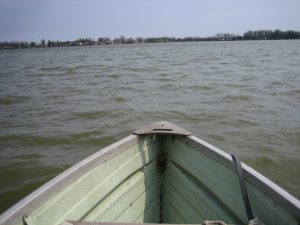 I've talked about oil prices and peak oil here in the past (on several occasions, really). You may remember that we had a panel of experts here in November to provide an outlook on the economic health of the area, and one of them said that as long as the price of oil doesn't reach $70/barrel, we'll be okay. Hmm - at the end of the week the price went up to $75 a barrel, a record and people are paying US$4/gallon in some areas. And - oh my - they're actually noticing.
I've talked about oil prices and peak oil here in the past (on several occasions, really). You may remember that we had a panel of experts here in November to provide an outlook on the economic health of the area, and one of them said that as long as the price of oil doesn't reach $70/barrel, we'll be okay. Hmm - at the end of the week the price went up to $75 a barrel, a record and people are paying US$4/gallon in some areas. And - oh my - they're actually noticing.
Perhaps its just an "Earth Day" thing, but it seems the impacts of human activities on the planet - and the resulting implications it has for our way of life - are making headlines more and more these days. Al Gore's movie about global warming is making waves around the country. Tim Flannery's disaster-is-nigh book The Weather Makers is really making the rounds in the media. President Bush is warning of a "tough summer," saying "The American people have got to understand what happens elsewhere in the world affects the price of gasoline you pay here." (Maybe a new official definition of "homeland security" is emerging?) Arnold the Terminator is weighing in, talking about the "self-inflicted wound that man has created through global warming." Even some local politicians are getting election heat for their role in narrow-minded and harmful decisions about the land in our community.
Is this a passing fad? A turning point in popular awareness of these serious issues, with unprecedented lifestyle changes and policy decisions to follow? An incremental corporate co-opting of the awareness that already exists for fun and profit? Or something else entirely? Regardless of the motives for any particular effort or project or headline, I hope that the end result is an increased appreciation for what seems to be some of the most significant (though largely self-imposed) challenges our species has faced. I hope that, as Rachel Carson put it so well, "the more clearly we can focus our attention on the wonders and realities of the universe about us, the less taste we shall have for destruction."
Last year I made a short video about the raising of a 104-foot wind turbine at the Cope Environmental Center here in town. I've just gotten around to posting it, so you can take a look and let me know what you think. It's a little dramatic and rough around the edges, but it was great to be a part of that experience and get it on film. Thanks also to Evan Agee for his help in some production design, and Geoff Greenfield of Third Sun Solar & Wind Power for the great work and juicy sound bites. If you haven't already, head on out to the Cope Center and check out all the renewable energy education stuff they have - it's cutting edge! (And if you're interested in that sort of thing, The Richmond/Wayne County Environmental Awareness Council hosts its sixth Environmental Awareness Luncheon on April 28 from 11:30 - 1:00 at Hills Pet Nutrition. There is no fee for the program and lunch is sponsored by Hills. Contact Jackie Vanderpool for more info.)
One can't help but notice a headline like that: "Humans spur worst extinctions since dinosaurs" - it might even bring one out of a blogging hiatus. You can read the full U.N. report in various languages, but the summary is that, "[i]n effect, we are currently responsible for the sixth major extinction event in the history of earth." We? Who, me? Wowsers. Considering how brief a time humans have been around in that earth history, we should be pretty proud of ourselves to make such a blip on the ole' radar! Hoo-hah.
But really, why does biodiversity matter?
Continue reading "Humans spur worst extinctions since dinosaurs"
Last weekend I had the opportunity to head to Crawfordsville for the first session of the Indiana Energy Conference, a series of film showings, discussions, and presentations designed to help us explore our culture's relationship with energy. The conference was organized by my friend Frank Cicela, who has been a long time participant in the IshCon conferences I've been involved in putting on since 1999, and he and I have collaborated on a few other projects as well. The IEC comes out of our trip to the Peak Oil conference last fall, and so much of the content of this new event is derived from the excellent presentations and materials that we encountered back then. Frank did an excellent job putting it all together at the local community theatre, and we had at least 60 people from around the region show up ready to learn and discuss. I was running around doing lights and sound and greeting and popping popcorn so I didn't get to do a whole lot of networking myself, but I could tell there were some good conversations happening. You can see some photos from the event, as well as the amazing press coverage Frank has generated, on the success story page of the conference site. The conference continues throughout the month; make sure to stop in if you're in the area!
Well, in case you hadn't noticed, it's taking me a while longer than I'd thought it would to synthesize my notes from the Peak Oil conference into blog postings. In the interest of getting them done and published at all, this entry will be much less detailed than my others, and hopefully you can check out the DVD of the conference (not yet available) if you want to learn more. You can start with my introduction if you're just joining us.
Continue reading "Peak Oil Conference: Sunday and Conclusions"

